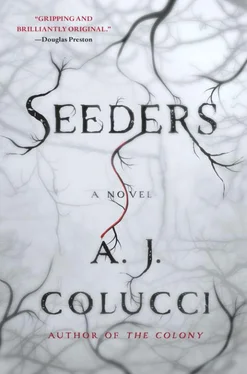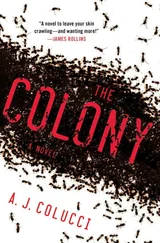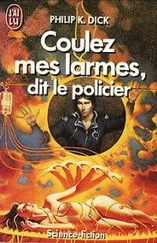The press, however, seemed to be largely ignoring him, content to talk and laugh among themselves. Schroeder, who was seated at the next table with a handful of notable scientists, gave Jules an impatient nod, beckoning him to get on with it.
Jules cleared his throat and addressed the reporters. “I’m so very pleased you could all be here,” he said in a smooth London accent, but his stark expression hinted he was anything but comfortable. “I believe you’ll find the documentary to be quite extraordinary.”
The reporters looked up from their plates with muted smiles, as if they could sense his unease. The man from The Times said, “I’m looking forward to the film. It was an interesting study, although I’m not exactly sure of the implications. Are you suggesting that plants have the same kind of intelligence as humans? I mean—should I be eating this salad?”
Jules politely laughed at the joke with the rest of his guests. “No, I wouldn’t go so far.”
“Dr. Beecher, I notice you haven’t touched your salad,” said an attractive reporter from Wired, the only woman at the table.
Jules speared a forkful of lettuce and made a show of chewing it with gusto. The guests seemed amused. He swallowed hard, wiping balsamic dressing from the corner of his mouth. “I wouldn’t say plant intelligence is equal to that of humans. Plants are complex beings with their own form of consciousness, but people tend to think of them almost like machines, with communication abilities more analogous to a light switch than a living organism. My experiments prove that plants can learn, remember, and respond as well as any creatures with a nervous system.”
Dr. Beecher’s research had in fact shown that plants communicate in ways similar to social beings. His first experiment involved five hundred specimens—tomatoes, string beans, and corn—set in rows according to species, with some intermingling. The test group, made up of ten tomato plants, was subjected to a mixture of sugar and alcohol, which is known to elicit the same response as if the plants were exposed to drought conditions—specifically closure of the stomata, to prohibit water loss.
Jules found that within a few minutes of the test group responding, the closest neighboring tomato also began to close its stomata, even though they were not exposed to the treatment. Somehow, the message traveled quickly across the species, as though they were all shouting to each other in a common language, Prepare for drought! Prepare for drought! Within an hour, all two hundred tomato plants had responded to the call.
Remarkably, two hours later the other species of plants, the string beans and corn, began closing up the stomata in their leaf cells as well. Jules reasoned they had taken extra time to translate the message, as though it were in a foreign language.
Even more astounding was a follow-up experiment in which Jules attempted to find the anatomical source of the plant signals. Using sensitive acoustical equipment placed underground, he discovered that the roots of the plant were making a clicking noise, a kind of chatter that registered at 220 hertz. It seemed there was a pattern to the clicks among the tomato plants, while the corn and string beans had their own unique pattern. When Jules recorded the clicks and played them back underground, he found that the roots of the plants all grew toward the sounds, and not just any clicks but only those specific to their species. Jules had opened the possibility that plants use a form of language to communicate with each other.
“You must have been surprised at your findings,” Wired said.
“More excited than surprised,” Jules replied. “We’ve known for centuries that plants communicate with each other. Take the poplar tree, for instance. When attacked by hungry caterpillars, not only will it produce a chemical repulsive to the insect, it will cue the surrounding trees to do the same. Although, in the case of poplars it’s by chemicals released through the leaves. We see the same thing with most plants. That lovely smell of fresh-cut grass is actually your lawn screaming.”
“That’s interesting, and a bit disturbing,” Wired said, jotting notes on a tablet. “So plants have several ways of signaling alarm.”
Jules noticed Schroeder watching from the next table. He gave a wink and a small thumbs-up, and Jules began to relax. “Right now my belief is that plants communicate through a combination of chemicals and sound, but there could be other means we’ve not yet explored.”
“Like telepathy?” The shabbily dressed man from the Enquirer brought the conversation to a halt. He was leaning back in his seat, rolling an unlit cigarette between his fingers.
“Sorry?” Jules said softly.
“Didn’t you work on some nutty experiment in the seventies, and then publish results that were never proven?”
Jules felt his heart skip a beat. He couldn’t tell if the reporter was kidding, but he had apparently done some research. “Are you referring to my years at Oxford?” He grinned and turned to the woman from Wired, who somehow seemed an ally. “I’m sure we’re all guilty of a few dreadful research papers.”
“I read your latest book.” Enquirer reached into a tattered cloth bag and pulled out a hardcover copy of The Human Delusion: Man’s Hierarchy of Life on Earth by Julian Beecher. “It was very amusing, by the way.”
Jules doubted the remark was meant as a compliment, but said, “Thank you.”
“I especially like the introduction.” The reporter began reading from a page bookmarked with a yellow sticky note. “‘Humans have long been under the delusion that we are somehow autonomous from the rest of nature, elevated above all of earth’s creatures. So terrified are we of losing our exalted status, we cling to the anthropocentric notion that we are the only intelligent life on earth.’”
Jules felt all the blood in his body suddenly rush to his cheeks, burning hot and tingly. It had been decades since he was faced with a contentious reporter. He threw a gaze to Schroeder, who was frowning deeply.
“I think that’s a very insightful introduction,” said Wired . “I couldn’t agree more with that statement.”
Enquirer dropped the book on the table with a thud. “So let me get this straight: You’re saying humans are on the same level as a petunia?”
Jules stared at the man. This kind of hostility always came from the same sort. Insecure hacks who got their kicks tearing down ideas too advanced for their small minds. No doubt he came for the free dinner as well. Nonetheless, Jules was resigned to keep his dignity and humor, and so he smiled jovially. “I was merely pointing out the fact that nonhumans, even plants, are more similar to us than we realize. Did you know that humans and chimpanzees share ninety-six percent of the same genes? Humans and cats share almost ninety percent. And nearly sixty percent of genes are shared between humans and asparagus.”
There were bits of laughter around the table.
“Well, blimey, ol’ chap,” Enquirer said, in mockery of Jules’s accent. “Obviously you have a different definition of intelligence than the rest of the planet.”
Jules tried to control his anger as he shifted uncomfortably in his seat. He didn’t like being made a fool, yet he couldn’t remember the protocol. Should he ignore the man or confront him with facts? His tone became more firm than friendly. “Darwin believed that intelligence is based on how efficient a species becomes at doing the things they need to survive. If you were to think in those terms, plants are actually more intelligent than humans. For seven hundred million years, they’ve graced the earth with nourishment, oxygen, and beauty. And for two hundred thousand years, mankind has scorched and raped our planet, seeming almost driven to destroy the environment—and, might I add, ourselves.”
Читать дальше












